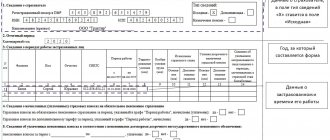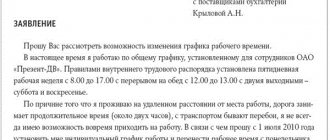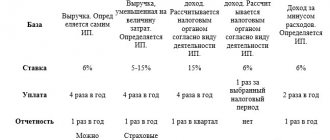Due to extreme climatic conditions, citizens living and working in the Far North and equivalent areas have the right to receive certain benefits and compensation. What benefits are provided to employees? What documents are used to establish them? Who has the right to them? We will answer these and other questions in this article.
Features of the regulation of labor of persons working in the regions of the Far North and equivalent areas (hereinafter referred to as northerners) are defined in Chapter. 50 Labor Code of the Russian Federation. The list of such areas is established by the Government of the Russian Federation. Today, the List of regions of the Far North and localities equated to regions of the Far North, approved by Decree of the Council of Ministers of the USSR dated November 10, 1967 N 1029, as amended by Decree of the Government of the Russian Federation dated April 18, 2004 N 245, continues to be applied.
By virtue of Art. 313 of the Labor Code of the Russian Federation, guarantees and compensation for persons working in the northern regions are established by the Labor Code of the Russian Federation, other federal laws and regulatory legal acts of the Russian Federation. In addition, regulatory legal acts of constituent entities of the Russian Federation and local governments, as well as collective agreements, agreements and other local regulations may establish additional benefits. Along with the Labor Code, one of the main laws establishing state guarantees is the Law of the Russian Federation of February 19, 1993 N 4520-1 “On state guarantees and compensation for persons working and living in the regions of the Far North and equivalent areas” (hereinafter referred to as the Law N 4520-1).
The legislative framework for establishing benefits and compensation also depends on the type of financing of organizations. Yes, Art. 1 of Law N 4520-1 establishes that for persons working in organizations financed from the federal budget, benefits are established by federal laws, in organizations financed from the budgets of constituent entities of the Russian Federation - by the laws of constituent entities of the Russian Federation, in organizations financed from local budgets - by municipal legal acts, and in organizations not related to the public sector - by the employer.
Before considering what compensation workers in the northern regions can expect, we note that, according to Art. 287 of the Labor Code of the Russian Federation, all benefits and compensation are provided at the main place of work.
Regional coefficient
One of the main benefits provided to this category of workers is the regional coefficient. According to Art. 315 of the Labor Code of the Russian Federation, wages in the regions of the Far North and equivalent areas are carried out using regional coefficients and percentage increases in wages.
In accordance with Part 1 of Art. 316 of the Labor Code of the Russian Federation, the size of the regional coefficient and the procedure for its application are established by the Government of the Russian Federation. But to date such a procedure has not been established.
Resolution No. 216 explains that until the size of the regional coefficient and the procedure for its application are established, regional wage coefficients introduced by decisions of government bodies of the USSR or federal government bodies are used to calculate wages for northerners.
In turn, state authorities of the constituent entities of the Russian Federation and local governments have the right, at the expense of their budgets, to establish higher regional coefficients, but only for institutions financed, respectively, from the budgets of the constituent entities of the Russian Federation and municipal budgets (Article 316 of the Labor Code of the Russian Federation).
The regional coefficients currently in force for workers and employees of manufacturing industries in the regions of the Far North and equivalent areas are established by separate regulations for each subject or its administrative-territorial unit. For non-production industries, they are established in a centralized manner and are given in information letters of the Ministry of Labor of the Russian Federation dated 06/09/2003 N 1199-16, dated 05/19/2003 N 670-9 and in the Letter of the Pension Fund of the Russian Federation dated 06/09/2003 N 25-23/5995.
The main limits of the coefficients, depending on the severity of the work and living conditions, range from 1.2 to 2 (for those working on Antarctic expeditions up to 3). The coefficient sizes and lists of districts approved by regulations of the USSR are currently used with additions and changes.
Note!
The regional coefficient is calculated at the place of actual permanent work, regardless of the location of the employer.
That is, if an employee works in a separate structural unit of an organization located in the northern regions, or has a traveling nature of work and travels to these regions, regardless of the location of the organization itself, payment for his work must be made taking into account the regional coefficient. If an employee works in the northern regions not constantly, but for a certain period of time, the regional coefficient is accrued to him for part of his salary in proportion to this time.
Moreover, the coefficient is calculated on the entire salary, which includes all payments in favor of employees, including remuneration for length of service.
In addition, the coefficient is calculated for allowances and additional payments to tariff rates (official salaries) and compensation payments related to working hours and working conditions, which include allowances:
- for class, title by profession, continuous work experience in the specialty, etc.;
- officials and citizens admitted to state secrets;
- for length of service (continuous work), as well as remuneration for length of service, paid quarterly or in a lump sum;
- based on the results of work for the year;
- for working conditions when working at night, shift work, for combining professions (positions).
At the same time, the following are not included in the earnings for which the regional coefficient is calculated:
— percentage bonuses to wages for work in the Far North and equivalent areas, as well as in the southern regions of Eastern Siberia and the Far East;
— all types of payments based on average earnings (vacation pay, payment for training of employees aimed at professional training, advanced training or training in second professions, etc.);
- material aid;
— one-time incentive payments not provided for by the organization’s remuneration system.
Unlike institutions financed from the federal budget, when only centrally established regional coefficients are used when paying their employees, commercial organizations, guided by Art. 135 of the Labor Code of the Russian Federation, can apply coefficients determined by relevant regulations (both at the federal level and at regional or local levels), enshrining them in collective agreements, agreements, local regulations, and employment contracts. It should be remembered that the conditions of remuneration cannot be worsened in comparison with those established by labor legislation and other regulatory legal acts containing labor law norms.
Note.
The regional coefficient is applied to the wages of persons employed in seasonal and temporary work, as well as part-time workers.
Providing benefits for workers in the Far North
Difficult working conditions, harmful production conditions, disruptions to the daily routine due to production needs - all these factors are the basis for motivational rewards for employees. Some regions of our country are located in a climate zone where living conditions are difficult due to severe frosts. For such regions, the state has developed a number of measures to support workers engaged in labor activities in the Far North:
| Benefits for workers in the Far North | Description |
| Regional coefficients | The wages of employees working in the regions of the Far North and areas equivalent to them should be indexed taking into account regional coefficients and percentage premiums for special climatic conditions (coefficients depend on the region and are established at the legislative level, the highest are in the Arctic Ocean regions) |
| Pension payments and retirement age | Work experience is calculated using a special coefficient, so northerners usually retire earlier than citizens of other regions of our country |
| Moving expenses | The employer, especially for budgetary organizations, is required to bear all expenses associated with the employee’s travel to the enterprise. If an employee moves for work, all expenses associated with the move and place of residence are borne by the company, and the employee has the right to request an additional week of leave to carry out the move itself and adapt to the new place of residence. |
| Additional leave | Leave for employees working in the Far North can be extended by 24 days a year. This type of incentive is aimed at compensating for difficult climatic conditions, and in budgetary organizations you can find a special bonus to vacation payments, which is provided as compensation for travel to the vacation destination. |
Salary supplements
Northerners should also be paid a percentage increase in wages. In contrast to the regional coefficient, when paying bonuses, it is necessary to take into account the length of service in these areas or localities. The amount of the percentage premium and the procedure for its payment (as well as the regional coefficient) are established by the Government of the Russian Federation (Article 317 of the Labor Code of the Russian Federation, Article 11 of Law No. 4520-1).
For your information.
Allowances are established without taking into account the regional coefficient and remuneration for length of service.
The procedure for determining work experience in the northern regions is regulated by the Instruction on the procedure for providing social guarantees and compensation to persons working in the regions of the Far North and in areas equated to the regions of the Far North, approved by Order of the Ministry of Labor of the RSFSR dated November 22, 1990 N 2 (hereinafter referred to as the Instruction), and also by Decree of the Government of the Russian Federation of October 7, 1993 N 1012 “On the procedure for establishing and calculating length of service for receiving a percentage increase in wages for persons working in the regions of the Far North and equivalent areas and in other regions of the Far North” (hereinafter referred to as Decree N 1012 ).
Note!
Resolution N 1012 established that from 06/01/1993, the length of service giving the right to receive a percentage increase in the monthly salary of northerners for whom a regional coefficient and a percentage increase in wages have been established is summed up regardless of the duration of the break in work and the motives for terminating the employment relationship, with the exception of dismissal for wrongdoing.
Guilty actions include, for example:
The entry into force of a court sentence by which an employee is sentenced to imprisonment, correctional labor outside the place of work, or to another punishment that precludes the possibility of continuing this work;
Repeated failure by an employee, without good reason, to fulfill labor duties assigned to him by an employment contract or internal labor regulations, if he has a disciplinary sanction;
Absenteeism (absence from the workplace without good reason for more than four hours in a row during the working day);
Appearing at work in a state of alcohol, drug or other toxic intoxication;
Commitment by an employee at the place of work of theft (including small) of someone else's property, embezzlement, intentional destruction or damage, established by a court verdict that has entered into legal force or a resolution of an authority authorized to apply administrative penalties;
Commitment of guilty actions by an employee directly servicing monetary or commodity assets, if these actions give rise to a loss of confidence in him by the employer;
Commitment by an employee performing educational functions of an immoral act incompatible with the continuation of this work;
Other cases of dismissal for guilty actions (inaction) provided for by the Labor Code of the Russian Federation and other federal laws.
If an employee moves to work in another region or locality (from among those indicated) and has the work experience necessary to receive this bonus, the percentage increase in wages is recalculated in proportion to the time worked in the corresponding northern regions, in the manner established for the new place of work.
According to clause 16 of the Instructions, the following types of percentage allowances are distinguished:
1) in the regions of the Far North - in the Chukotka Autonomous Okrug and the North-Evensky District of the Magadan Region, the Koryak Autonomous Okrug and the Aleutian District of the Kamchatka Region, as well as on the islands of the Arctic Ocean and its seas (except for the islands of the White Sea) - 10% of earnings after the first six months of work with an increase of 10% for each subsequent six months of work, until 100% of earnings are reached;
2) in other regions of the Far North - 10% of earnings after the first six months of work with an increase of 10% for each subsequent six months of work, and upon reaching a 60% bonus - 10% of earnings for each subsequent year of work until 80% is reached. earnings;
3) in areas equated to the regions of the Far North - 10% of earnings after the first year of work, with an increase of 10% of earnings for each subsequent year of work until 50% of earnings are reached.
Young workers under the age of 30 who have lived in the northern regions for at least five years are entitled to a full percentage increase in wages from the first day of work. Persons who have lived in these areas for less than five years but more than one year receive the maximum bonus after two and a half years of work in areas where the bonus reaches 80%, and after three and a half years where the 100% bonus applies.
Salary
As a general rule, remuneration for persons working in the regions of the Far North and equivalent areas is carried out using regional coefficients and percentage increases in wages.
Despite the unambiguity of this norm, employers often try to circumvent its provisions, citing certain circumstances. In particular, a lot of disputes are raised by the question of the interpretation of such a concept as “place of work”, on which in this case, in fact, it depends on whether the employee will receive increased earnings or not. As a rule, the employee’s labor is used at the place of work, that is, at the location of the employing organization itself. At the same time, the work of individual employees can be organized outside the location of the employer, its representative office, branch, or other separate structural unit. Which in turn allows individual employers to abuse their rights to the detriment of the rights of employees.
In order to protect the rights of employees of separate divisions the Supreme Court of the Russian Federation explains that when calculating wages, in any case, the regional coefficient and percentage bonus established for wages in the region or locality where the work is performed must be applied.
This means that, regardless of the location of the organization, wages for employees of its separate structural unit located in the regions of the Far North and equivalent areas are paid using regional coefficients and percentage increases in wages. That is, for the purpose of applying these benefits, the location of an organization should be understood not only as the location of its main office, but also all areas in which branches, representative offices and other separate structural units of the organization are located.
Moreover, allowances and coefficients can be applied even due to the very fact of performing a labor function in the North , regardless of the location of the company’s offices and branches. Currently, courts, when considering disputes regarding the calculation of regional coefficients and percentage bonuses, often do without examining the issue of the employee’s actual place of work. But it is the actual place of work that is of key importance here.
In this regard, the Review, approved by the Presidium of the Supreme Court of the Russian Federation on February 26, 2014, notes that the regional coefficient and percentage bonus are accrued to the employee’s salary depending on the place where he performs his labor function, and not on the location of the employer who employs the employee . The same applies to part-time work - for persons working part-time in areas where regional coefficients and percentage increases in wages are established, remuneration must be made taking into account the specified coefficients and allowances.
At the same time, the Supreme Court calls for a distinction between regional coefficients and percentage increases and the mechanisms for their application . Thus, in contrast to regional coefficients, which are accrued from the first day of work in the regions of the Far North and localities equivalent to them, the size of the percentage bonus depends on the length of work in these territories. This provision gives dishonest employers the opportunity in a number of cases, namely when employees have long breaks in work, not to pay a percentage increase in wages.
Meanwhile, the Plenum of the Supreme Court explains that the length of service required to calculate a percentage increase in wages for employees of enterprises located in the Far North is summed up regardless of the duration of the break in work. At the same time, judges recommend that law enforcement officers follow the norms of the Instruction on the procedure for providing social guarantees and compensation, approved by Order of the Ministry of Labor of the RSFSR dated November 22, 1990 No. 2.
In accordance with this instruction, employees of enterprises, organizations and institutions who quit their previous jobs retain continuous work experience, which gives them the right to receive a salary increase for work if the break in work does not exceed the time limits established by current legislation.
Employees who quit after January 1, 1991 retain uninterrupted length of service, entitling them to receive bonuses for work in areas located in the Far North and equivalent areas, if there is a break between the day of dismissal and the day of entry to work at enterprises, in organizations and institutions in these areas does not exceed the deadlines established by current legislation. If the specified periods are exceeded, the amounts of bonuses for continuous work experience are reduced in the same manner and amounts as provided for an increase in work experience.
Moreover, from June 1, 1993, the length of service giving the right to receive a percentage increase in monthly wages for persons working in the regions of the Far North, equivalent areas and in other regions of the North, where the regional coefficient and percentage increase in wages are established, is summed up regardless of the duration of the work break.
There are also many disputes regarding the grounds for termination of employment relations - a number of courts believe that these grounds are of fundamental importance for calculating the length of service necessary to establish a percentage increase.
Here, the Supreme Court points out that the percentage increase in wages is an integral part of remuneration and, by its nature, refers not to incentive payments for achieving certain results, but to guarantees and compensation provided for work in special climatic conditions. The right to a percentage increase is made dependent directly on length of service in the Far North and equivalent areas.
At the same time, the norms of labor legislation do not link the provision of guarantees and compensation with the reasons for termination of the employment contract, and do not provide grounds on which the employee’s right to a percentage increase in wages in accordance with his length of service in special climatic conditions can be terminated or limited.
There is no uniform judicial practice when resolving the issue of the possibility of using a percentage increase to calculate the wages of prisoners sentenced to imprisonment who were involved in paid work in the regions of the Far North and equivalent areas while serving their sentences.
Thus, some courts still satisfy the demands of those sentenced to imprisonment to collect a percentage increase, coming to the conclusion that the current legislation does not allow any exemptions in terms of remuneration for the above-mentioned persons. A number of other courts note that those sentenced to imprisonment do not have the right to receive a percentage increase in wages for work experience in special climatic conditions.
In order to develop a common opinion on this issue, the Supreme Court recommends turning to the norms of the Penal Code of the Russian Federation, according to which everyone sentenced to imprisonment is obliged to work in places and jobs determined by the administration of correctional institutions. For its part, the administration of correctional institutions is obliged to attract convicts to work, taking into account their gender, age, ability to work, state of health and, if possible, specialty, as well as based on the availability of jobs.
Thus, convicts are brought to work not of their own free will, but in accordance with the requirements of penal legislation. Since socially useful work is one of the components of the process of serving a sentence, their labor relations with the administration of the correctional institution are of a specific nature.
Thus, those sentenced to imprisonment have the right to wages, but they do not apply to persons working under employment contracts, that is, those who are in labor relations with institutions in which they are employed while serving their sentence, while the law on state guarantees and compensation for persons working and living in the Far North, it applies specifically to persons working on the basis of an employment contract.
Additional leave
Article 116 of the Labor Code of the Russian Federation establishes annual additional paid leave for northerners. At the same time, employers, taking into account their production and financial capabilities, can independently establish additional leaves for employees, the procedure and conditions for the provision of which are determined by collective agreements or local regulations, which are adopted taking into account the opinion of the elected body of the primary trade union organization.
In accordance with Art. 321 of the Labor Code of the Russian Federation for workers in the Far North, additional leave is 24 calendar days, and for persons working in areas equated to regions of the Far North - 16 calendar days. The right to receive additional leave arises for employees on a general basis, that is, after six months with a given employer.
As for the full or partial combination of main and additional leave for employees of the northern regions, such a connection is allowed for no more than two years. In this case, the total duration of the granted leave should not exceed six months, including the time of unpaid leave necessary for travel to the place of use of the leave and back, and the unused part of the annual paid leave exceeding six months is added to the next annual paid leave for the next year (Article 322 of the Labor Code of the Russian Federation).
Persons working in budgetary organizations in the northern regions have the right to pay once every two years at the expense of the employer the cost of travel within the territory of the Russian Federation to the place of vacation and back by any type of transport (except for taxi), including personal, as well as payment for baggage transportation weighing up to 30 kg.
Note!
If the travel of the employee and his family to the place of vacation and back is carried out by personal transport, then payment for the cost of such travel is made at the lowest cost of travel by the shortest route.
Compensation for the cost of travel and luggage transportation to and from the place of vacation use for persons working for employers not related to the public sector is established by collective agreements, local regulations adopted taking into account the opinion of the elected bodies of primary trade union organizations, labor contracts (Article 325 Labor Code of the Russian Federation).
Please note: if an employee does not exercise his right to the specified compensation when using vacation in a timely manner (after 12 months, then in the fourth, sixth, etc. year of work), he loses this right.
An employee may ask to replace with compensation a portion of paid leave exceeding 28 calendar days. Compensation is paid based on the employee’s written application.
In the case of summing up annual paid leave or transferring it to the next working year, monetary compensation can replace the part of each annual paid leave exceeding 28 calendar days, or any number of days from this part (Part 2 of Article 126 of the Labor Code of the Russian Federation). For example, an employee is entitled to annual leave in the amount of 28 calendar days and 14 calendar days of additional leave. In one year, he took 36 calendar days off (28 main vacation + 8 additional). During the second year, he took 20 calendar days off work. Thus, the employee has the right to compensation for 6 days of additional leave for the first year and 14 days for the second, for a total of 20 calendar days, and 8 days of basic leave for the second year are not subject to compensation.
It is not allowed to replace with monetary compensation annual basic and additional paid leave for pregnant women and employees under the age of 18, as well as annual additional paid leave for persons employed in work with harmful and (or) dangerous working conditions, for work in appropriate conditions (except payment of monetary compensation for unused vacation upon dismissal) (Part 3 of Article 126 of the Labor Code of the Russian Federation).
Rest time for workers in the “northern” regions
Persons working in the Far North and equivalent areas are entitled to annual paid leave of 28 calendar days on a general basis (Article 115 of the Labor Code of the Russian Federation). In addition, they may be granted additional leave for:
— work in harmful and (or) dangerous working conditions (Article 117 of the Labor Code of the Russian Federation);
— special nature of the work (Article 118 of the Labor Code of the Russian Federation);
- irregular working hours - at least three calendar days (Article 119 of the Labor Code of the Russian Federation). Let us recall that the rules for providing such leave in organizations financed from the federal budget were approved by Decree of the Government of the Russian Federation of December 11, 2002 N 884.
In addition to the specified holidays Art. 14 of Law N 4520-1 and Art. 321 of the Labor Code of the Russian Federation provides for the provision of annual additional leave for northerners lasting:
— in the regions of the Far North — 24 calendar days;
- in equivalent areas - 16 calendar days;
- in other regions of the North, where the regional coefficient and percentage increase in wages are established - 8 calendar days.
Note. The minimum duration of additional paid leave for work in harmful or dangerous working conditions is established by Decree of the Government of the Russian Federation of November 20, 2008 N 870 and is seven calendar days.
This additional paid leave is provided to employees after six months of work with a given employer and can be added to the main annual paid leave (Article 322 of the Labor Code of the Russian Federation). At the same time, full or partial combination of annual paid leave for “northerners” is allowed for no more than two years.
The total duration of leave granted should not exceed six months, including the time of unpaid leave necessary for travel to and from the place where the leave is taken.
The unused part of the annual paid leave exceeding six months is added to the next annual paid leave for the next year.
Note! At the request of one of the working parents (guardian, custodian), the employer is obliged to provide him with annual paid leave or part thereof (at least 14 calendar days) to accompany a child under the age of 18 entering educational institutions of secondary or higher vocational education located in another country. terrain. If there are two or more children, leave for this purpose is granted once for each child (Article 322 of the Labor Code of the Russian Federation).
Article 319 of the Labor Code of the Russian Federation allows one of the parents (guardian, trustee, foster parent) working in the Far North region (equivalent area) and having a child under the age of 16 years, upon written application, to receive an additional day off every month. Such a day is not subject to payment.
Other guarantees and benefits
Guarantees of medical care ( Art. 323
Labor Code of the Russian Federation). For persons working in organizations financed from the federal budget and other organizations located in the northern regions, a collective agreement may provide for payment of the cost of travel within the territory of the Russian Federation for medical consultations or treatment in the presence of an appropriate medical report, if these consultations or treatment cannot be provided at the place of residence at the expense of the organization. The list of guarantees of medical care for employees of other organizations can be expanded and depends on the financial capabilities of the employer.
Additional day off ( Art. 319
Labor Code of the Russian Federation). One of the parents (guardian, trustee, foster parent) working in the northern regions and having a child under the age of 16, upon his written application, is given an additional day off every month without pay.
Shortened working week ( Art. 320
Labor Code of the Russian Federation). For women working in the northern regions, a collective or labor agreement establishes a 36-hour work week, unless a shorter work week is provided for them by federal laws. In this case, wages are paid in the same amount as for a full working week. If, on the basis of federal laws, a shortened working week is established for an employee on other grounds, then on the basis of Art. 320 of the Labor Code of the Russian Federation, it is not established.
Guarantees in the event of liquidation of an organization or reduction in the number or staff of employees of the organization ( Article 318
Labor Code of the Russian Federation). An employee who is dismissed from an organization located in the Far North or an equivalent area due to the liquidation of the organization or the reduction of employees of the organization is paid a severance pay in the amount of average monthly earnings. The average monthly salary for the period of employment is also retained, but not more than three months from the date of dismissal (including severance pay).
In exceptional cases, the average monthly salary is retained by the specified employee during the fourth, fifth and sixth months from the date of dismissal by decision of the employment service body, provided that within a month after dismissal the employee applied to this body and was not employed by it.
Guarantees and compensation for persons working on a rotational basis ( Article 302
Labor Code of the Russian Federation). Workers who travel to the northern regions from other regions to perform work on a rotational basis have the right to establish a regional coefficient, a wage supplement and additional paid leave provided for persons permanently working in the Far North and equivalent areas.
The work experience, which gives the right to appropriate guarantees and compensation, includes calendar days of shift in the northern regions and actual days on the road, provided for by the shift work schedules.
Housing subsidies. Citizens who arrived in the northern regions no later than 01/01/1992, who have a total length of work experience in these areas of at least 15 calendar years, who do not have housing in other regions of the Russian Federation or who need to improve it, are entitled to housing subsidies. This right is reserved for citizens who, in accordance with previously effective legislation, acquired it if they had work experience in the specified areas and localities for at least 10 calendar years and were registered at their place of residence as needing improved housing conditions.
The procedure for providing such subsidies is approved by Decree of the Government of the Russian Federation dated March 21, 2006 N 153 “On some issues of the implementation of the subprogram “Fulfillment of state obligations to provide housing for categories of citizens established by federal legislation” of the federal target program “Housing” for 2011-2015.”
According to Decree of the President of the Russian Federation dated May 23, 1996 N 757 “On additional measures of state support for citizens leaving the regions of the Far North and equivalent areas”, pensioners and other citizens who have worked in the northern regions for at least 10 years and have lost their jobs due to termination of their activities enterprises and the liquidation of settlements located in these regions, enjoy the right of priority to receive housing on the territory of the Russian Federation.
Benefits when assigning a pension. Article 28 of the Federal Law of December 17, 2001 N 173-FZ “On Labor Pensions in the Russian Federation” establishes the early assignment of a labor pension to the following citizens:
- men upon reaching the age of 55 years and women upon reaching the age of 50 years, if they have worked for at least 15 calendar years in the Far North or at least 20 calendar years in equivalent areas and have an insurance record of at least 25 and 20 years, respectively;
- for citizens who worked both in the Far North and in equivalent areas, a labor pension is established for 15 calendar years of work in the Far North. Moreover, each calendar year of work in areas equated to the regions of the Far North is considered to be nine months of work in the regions of the Far North;
- citizens who have worked in the Far North for at least 7 years and 6 months are granted a labor pension with an age reduction of four months for each full calendar year of work in these areas;
- men who have reached the age of 50 years, and women who have reached the age of 45 years, permanently residing in the regions of the Far North and equivalent areas, who have worked, respectively, for at least 25 and 20 years as reindeer herders, fishermen, and commercial hunters.
In addition, for employees who go on business trips to the Far North and equivalent areas, these periods are counted towards their length of service, which gives them the right to an early retirement pension.
Also, citizens from among the small peoples of the North are assigned a social pension with a reduction in the generally established retirement age by 5 years - upon reaching the age of 55 years for men and 50 years for women. This takes into account not only their nationality, but also their place of residence in certain areas of the North, that is, in difficult natural and climatic conditions.
Regulatory legal acts of the Russian Federation also establish guarantees and compensation for citizens of the northern regions, studying in educational institutions belonging to the small peoples of the North, military personnel dismissed due to age or due to reduction of the Armed Forces, receiving benefits for temporary disability or pregnancy and childbirth at the expense of the Social Insurance Fund (Article 3 of Law No. 4520-1).
Who is entitled to guarantees and compensation?
Based on Art. 1 of Law N 4520-1, guarantees and benefits are provided for persons employed permanently or temporarily in organizations located in the regions of the Far North and equivalent areas, regardless of their form of ownership, and persons living in these areas and areas.
Article 3 of Law N 4520-1 specifies that guarantees are established for:
— employees of organizations financed from the federal budget;
— persons studying in higher educational institutions, institutions of primary and secondary vocational education, financed from the federal budget;
— citizens belonging to the small peoples of the North;
— citizens receiving benefits for temporary disability, pregnancy and childbirth at the expense of the Social Insurance Fund;
— non-working pensioners;
— military personnel dismissed due to age or due to reductions in the RF Armed Forces.
It is noted that additional guarantees and compensations for northerners can be established (Article 313 of the Labor Code of the Russian Federation) for employees:
- organizations financed from the budgets of constituent entities of the Russian Federation - by the laws of these constituent entities of the Russian Federation;
- organizations financed from local budgets - by regulatory legal acts of local governments;
- other organizations not related to the public sector - by the employer (in addition to state guarantees).
* * *
Unlike budgetary organizations, commercial organizations located in the northern regions (having separate divisions there) independently determine whether or not to provide employees with certain benefits and guarantees (such as medical care or vacation-related compensation). But despite the freedom of choice provided, the manager must understand that these benefits are just as necessary due to the specific nature of work in the difficult conditions of the northern regions as the rest. In any case, if the organization has the opportunity to provide them, the conditions and procedure for provision must be outlined in a collective agreement or other local regulation.
Pension payments and retirement age for district employees
Until recently, the calculation of length of service for workers in the Far North was carried out taking into account a special accelerating factor - 1 year was equal to 1.5 years. This was explained by a certain degree of harmfulness of the harsh climate of the Far North and provided the opportunity for early retirement with a special pension benefit. At the same time, workers in the Far North can count on the possibility of early retirement. For women, the retirement age is 50 years, and for men, 55 years, provided that the work experience in the Far North region is at least 15 years, and for areas equivalent to them - 20 years. In this case, the insurance period is 20 and 25 years. If labor activity in areas with severe climatic conditions is more than half with the same required insurance period, the retirement age increases proportionally.
Regulatory acts regulating the provision of benefits for workers of the Far North
| Name of the normative legal act | Title of the document | Description |
| Labor Code | Article 148 | Regulates the legal procedure for calculating wages of employees working in areas with special climatic conditions, taking into account established standards and the use of special coefficients |
| Article 316 | Regulates the size of regional coefficients for remuneration of employees working in the regions of the Far North | |
| Article 317 | Regulates the amount of the percentage bonus for remuneration of employees working in the Far North regions | |
| Article 314 | Regulates the legal procedure for calculating the length of service of workers in the Far North to receive a percentage bonus |








